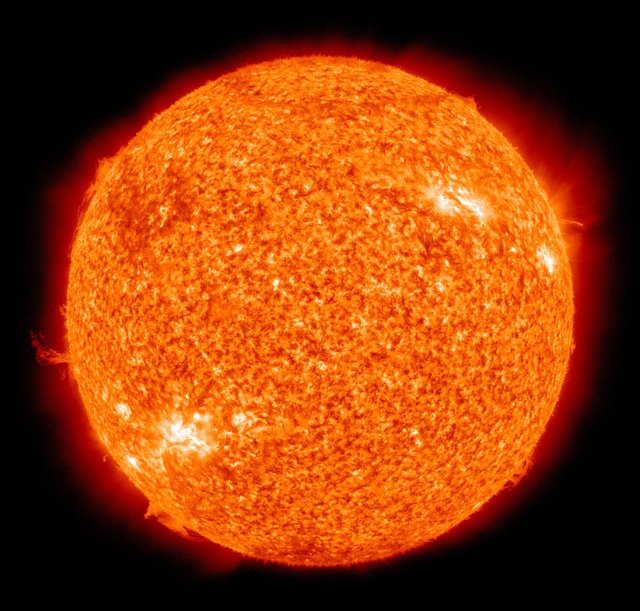Check Engine

Across the scientific community, panic reigned.
All around the world, the greatest human minds collectively analyzed the cryptic message, totally at a loss as to its precise meaning, but all quite certain it portended a serious problem.
A famed professor of astronomy and astrophysics at Cambridge University led the efforts. His team designed a fleet of cubesats - small satellites, 1 foot by 1 foot cubes - which would be sent into a stable orbit as close to the Sun as possible, and scan for any kind of signs of instability. The fleet cost billions of dollars to design and deploy, but the nations of the world footed the bill. Based on the nature of the message they received, and the public's response, they felt they had no choice.
The message was coming in constantly, over the course of 20 generations, although in the beginning no one knew it was being collected. It was only by sheer chance, comparing a recording of the sun's radio signals from the last few decades, that an intern at Stanford noticed a discrepancy. Out of 172 recordings, 3 shared an identical, 4 second abnormality - a hiccup in the generally random radio interference captured from the Sun.
Further recordings were made over the course of 6 months, and found that the same abnormal signal, lasting 4 seconds every time, was being transmitted, from the Sun itself, every 21 days.
Cryptologists and data analysts around the world sat down with the signal and broke it apart into its component parts. Hidden inside of the static haze, the signal contained a burst of ordered data, exactly three words. When the first team, a group in Ukraine, decrypted the signal and revealed its contents, no one believed them. Only when a half dozen other teams had replicated their process, and come to the same result, did the scientific community take it seriously.
The message from the sun was simple:
Check Engine
There were a number of terrifying and astounding implications of the Sun itself emitting an instruction to "Check Engine". To the hard sciences, it defied most reasonable and theorized precepts about how the universe worked. To philosophers, it raised new and profound questions, heretofore unconsidered, about the nature of sentience itself.
But to most people - who knew nothing more about the Sun than that it was a giant ball of fire which, under no circumstances, should ever be talking to anyone - the message was cause for incredible concern. When the signal was leaked to the public, panic grew like a brush fire, despite scientific assurances that the Sun appeared completely "healthy", and there was no reason to believe the Sun was in any real danger.
Nonetheless, governments soon relented, and a global coalition was formed. It was that coalition which funded the Cambridge program, along with several other moonshot ideas to analyze the sun and "check" its "engine." The total cost to the human race was over 1 trillion dollars.
The Cambridge mission, along with several others, were launched within six months of the message being decoded. It took a couple of more years for the results to be beamed back to Earth, but they were all absolutely unequivocal. The Sun was totally fine. There was no indication of anything being wrong with it. Humanity had, in fact, checked the Sun's engine - the density, heat and electromagnetism of its fiery core - and given the Sun a clean bill of health.
Things on Earth settled down after the results came back. People resolved to put their faith in science - all but a small cadre of inevitable conspiracy theorists, who insisted the Sun's "Engine" was about to blow a gasket. But, by and large, everything went back to normal.
Of course, scientists now knew that the Sun was able to communicate externally via radiowaves, and although the message they had so far received was incorrect, the possibility of receiving future messages was too alluring an opportunity to pass up. A permanent listening post was launched into low-Earth orbit, it's mechanical ear pointed directly at the Sun, listening to its every squeak.
The listening satellite was in orbit within a year of the Sun receiving a clean bill of health and, immediately upon being turned on, it reported an anomalous signal.
Once again, every scientist on Earth was set to the task of decoding it, this time much more quickly. The results of the decoding came in from dozens of teams around the world, all within 24 hours, and all with no small amount of annoyance.
This new message, repeating every 21 days, read:
Ha Ha Ha, Dickheads
By NASA/SDO (AIA) [Public domain], via Wikimedia Commons
I think the ingenious part about this story is the (title) message. Somehow, it forms a juxtaposition to the rest of the story. Maybe because of its brevity, maybe because it seems kinda funny (the ending confirms this), maybe because the expectation while you're reading the story is nothing like what the message turns out to be.
Because of this, in a way, the story can be divided into two parts: before the message, and after the message. Which is how it should be, considering that the thing that shook the people in the story, should be the focal point around which the story itself turns.
Stanford?
Haha - you've never heard of Standford university?
Thanks for the insightful comment Alex.
To listen to the audio version of this article click on the play image.

Brought to you by @tts. If you find it useful please consider upvote this reply.
.
The sun is very hard and strong magnetic fields Sending a satellite there Requires a sophisticated science
Mayde my night 😎😈